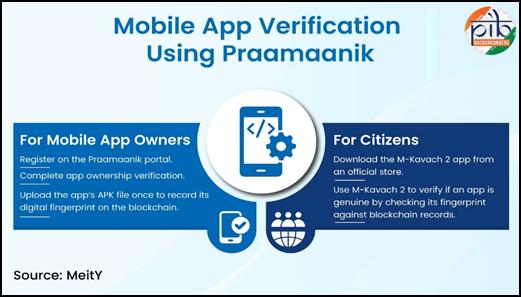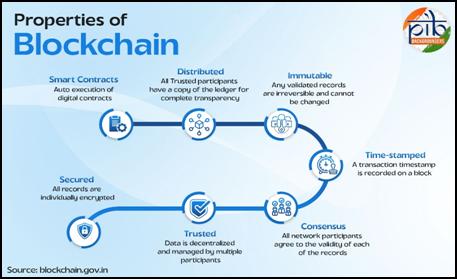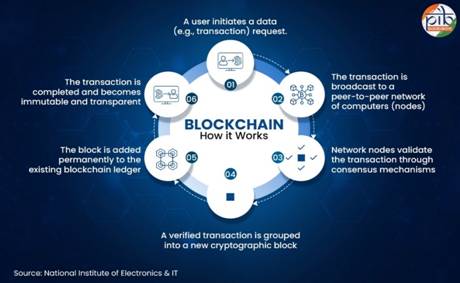India is accelerating its adoption of blockchain technology to transform governance, enhance transparency, and strengthen digital trust through the National Blockchain Framework (NBF). Launched officially on September 4, 2024, with an initial budget outlay of ₹64.76 crore, the NBF provides a unified architecture for deploying blockchain solutions across government services and public platforms.
Emerging from its early association with cryptocurrencies, blockchain technology has evolved into a critical digital innovation capable of establishing verifiable trust without intermediaries. Unlike technologies such as Artificial Intelligence, which rely on computational power, blockchain’s value lies in its tamper-resistant, distributed ledger system. Records are maintained securely across multiple nodes, making unauthorized modifications virtually impossible and significantly enhancing data integrity.
The Ministry of Electronics and Information Technology (MeitY) has spearheaded the development of the NBF to integrate blockchain into public service delivery, aiming to improve accountability, efficiency, and transparency. Central to the framework is the Vishvasya Blockchain Stack, an indigenous and modular platform providing the technical foundation for building and deploying permissioned blockchain applications. The platform offers Blockchain-as-a-Service (BaaS), distributed infrastructure across NIC data centers in Bhubaneswar, Pune, and Hyderabad, a permissioned blockchain layer for verified participants, and open APIs for seamless integration with e-governance systems.
To foster innovation and experimentation, NBF includes NBFLite, a sandbox version of the blockchain stack designed for startups, academia, and research institutions. It allows users to prototype applications in key governance areas such as supply chains and digital certificates. Another notable initiative, Praamaanik, leverages blockchain to verify the authenticity of mobile applications, protecting users from malicious apps and fraudulent customer support services.
The National Blockchain Portal further outlines India’s strategic approach to blockchain adoption across governance and industry, promoting standardization, cross-sector integration, and innovation. India’s NBF is among the few state-led initiatives globally to support blockchain across multiple sectors, demonstrating the country’s leadership in emerging technologies.
Several blockchain-enabled chains are already transforming governance and public service delivery. The Certificate and Document Chains allow secure issuance, storage, and retrieval of documents, including academic certificates and government-issued records such as caste, income, and birth certificates. Over 34 crore documents have been verified through India’s blockchain platform, ensuring authenticity and reducing delays.
The Logistics Chain enhances transparency in supply chains by recording all transactions in a tamper-proof ledger. A key example is Karnataka’s Aushada system for medicine supply management, where blockchain enables traceability of drug movement from manufacturers to hospitals, along with quality and expiry verification, reducing the risk of spurious drugs.
The Judiciary Chain and the Inter-Operable Criminal Justice System (ICJS) integrate blockchain to enhance efficiency and trust within the justice system, facilitating secure and time-stamped records of judicial data and documents. Over 39,000 ICJS documents and 665 judiciary documents have been verified on the platform, streamlining case management and reducing manual dependencies. The Property Chain similarly ensures transparency in land and property transactions, helping verify ownership and rights while minimizing disputes.
India’s strategic roadmap for blockchain adoption includes regulatory initiatives and capacity-building programs. The Centre of Excellence in Blockchain Technology, established by NIC, provides consultancy, training, and support for pilot projects, working with popular blockchain platforms such as Hyperledger Fabric, Hyperledger Sawtooth, and Ethereum. The Telecom Regulatory Authority of India has integrated blockchain-based Distributed Ledger Technology to track SMS transmissions, enhancing consumer protection and compliance. The Reserve Bank of India is also leveraging blockchain for projects like the Digital Rupee, demonstrating traceable and transparent payments to strengthen financial inclusion. Additionally, NSDL has adopted blockchain for Debenture Covenant Monitoring, modernizing capital market operations.
Capacity-building initiatives under MeitY, including skill development programs for government officials, the Post Graduate Diploma in FinTech & Blockchain Development, C-DAC’s BLEND online course, and FutureSkills PRIME, are creating a skilled workforce ready to leverage blockchain technology across sectors.
The government is exploring future use cases such as blockchain-based land records, blood bank management, GST monitoring, and public distribution systems to enhance efficiency, accountability, and citizen trust.

















